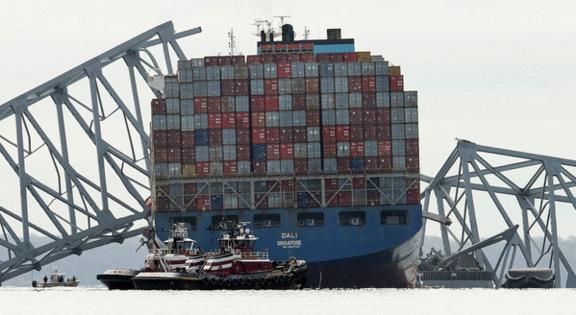Baltimore bridge collapse creates shipping headaches at major auto hub
Published in Automotive News
The Maryland bridge collapse that severed access to the Port of Baltimore early Tuesday is expected to cause some shipping delays and logistical headaches for the auto industry.
The Baltimore port handled 847,158 cars and light trucks in 2023 — the 13th consecutive year it led all other U.S. ports in that sector. It's unclear how long the port will be closed as investigators review what happened when a container ship struck the Francis Scott Key Bridge at about 1:30 a.m., causing it to collapse into the Patapsco River below.
Detroit's three major automakers rely on the Baltimore port to different extents and were assessing the effects Tuesday. Foreign automakers like Mitsubishi Motor Corp. said they were significantly affected, though at least two that lean heavily on Baltimore for importing — Volkswagen AG and BMW AG — have operations located just outside the zone cut off by the bridge debris.
The potential automotive shipping interruption comes after years of automakers and their suppliers battling supply chain woes following the pandemic, including the 2021 semiconductor shortage that resulted in millions of fewer vehicles being produced and hundreds of billions of dollars in lost revenues. The crisis pushed the industry — from automakers to dealers — to rethink the handling of the supply chain.
"It's a large port with a lot of flow through it, so it's going to have a lot of impact. It's just at this point we'll have to understand what that means for us specifically," Ford Motor Co.'s Chief Financial Officer John Lawler said in an interview with Bloomberg television. "We'll work on the workarounds. We'll have to divert parts to other ports along the East Coast or elsewhere in the country. And it'll probably lengthen the supply chain a bit."
The Port of Baltimore said in a statement that all vessel traffic to and from the port was "suspended until further notice," though trucks were still being processed at its marine terminals. The port said it didn't know how long vessel traffic would be halted as authorities searched for several people missing and began cleaning up the wreckage of the bridge.
Maryland Gov. Wes Moore said during a media briefing he also did not have an estimate on how long it would take before shipping could resume because the early focus of response efforts was on saving lives after members of a construction crew had fallen in the water during the collapse. By mid-afternoon, authorities said they remained focused on search-and-rescue efforts.
Even with unknowns on a reopening timeline, the auto industry should be able to navigate the situation given the disruptions of the post-pandemic years.
"The number of times that the OEMs and suppliers have had to jump through hoops and have additional inventory in place and their contingency plans for their contingency plans, this is probably just somebody opening up a playbook that they developed over the last three years ... and just quickly pulling the levers," said Dan Hearsch, Americas co-leader in the automotive and industrial practice at AlixPartners LLP, a financial advisory and global consulting firm.
"The visibility that companies have into where their products are in terms of being in a container on a particular ship is so much better today than it was four years ago that the uncertainty is probably not eliminated, but it is so much less than it used to be."
...continued
©2024 www.detroitnews.com. Visit at detroitnews.com. Distributed by Tribune Content Agency, LLC.







Comments